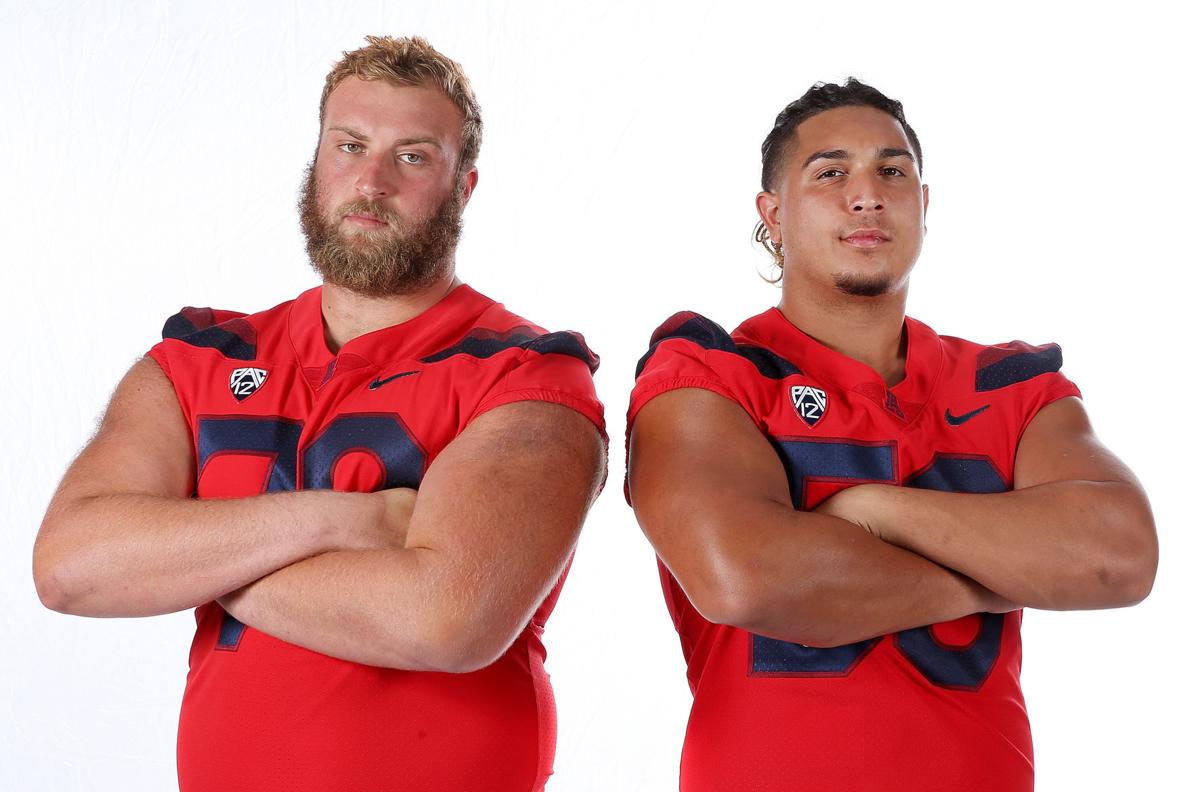Editor's note: This story is part of the Star's Aug. 27 college football preview section.
Jacob Alsadek and Layth Friekh are two of the best players on what might be the Arizona Wildcats’ best unit.
Alsadek, the right guard, and Friekh, the left tackle, are seasoned seniors with ample starting experience. They will serve as valued leaders for the 2017 Wildcats, who will lean on a cast of lesser-known players as they try to improve on a 3-9 season.
Alsadek and Friekh are also practicing Muslims — which makes them two of the most interesting people on a squad full of fascinating characters.
This is an interesting time to be a Muslim in America. But the reality of their lives, even in the current political climate, isn’t the stuff of New York Times headlines. Even after the election and the travel ban, and amid all the rhetoric, their day-to-day hasn’t changed much, if at all.
It might have something to do with how they look. Neither would make it past the initial casting call.
“Everybody thinks I’m white,” Alsadek said, laughing.
Alsadek sports a thick beard, but his hair is sandy brown. He grew up in San Diego, and if he weren’t 6 feet 7 inches and 325 pounds, he’d resemble countless other Southern California kids.
Alsadek’s father, Louay, was born in Kuwait and is of Lebanese descent. His mother, Sophia, is part Danish, part Italian.
“Nobody will believe me,” Alsadak said when asked how strangers react upon learning of his Middle Eastern heritage. “Everybody thinks I’m kidding, but I’m not. I don’t look like it at all.”
“Same with me,” Friekh said. “People think I’m from the island because I have curly hair. I’m like, ‘No, half-Arab, half-Mexican.’”
Friekh’s dad, Akram, also was born in Kuwait and is of Palestinian descent. Friekh grew up in Glendale.
Like their father, Layth and his younger brother, Humza, were brought up in the Muslim faith. Layth prays regularly and tries to make it to mosque every Friday. He isn’t quite as disciplined as his dad, who lives in Dubai, United Arab Emirates, where he works as an engineer.
“I try to be as religious as he is,” Friekh said. “It’s kind of hard. It’s easier to be religious in a Muslim country than it is here. I try to have his values. That’s how he raised me.
“Everybody’s Muslim over there. On the team, there’s one other guy.”
Friekh said no one he knows has been affected by the travel restrictions imposed by the Trump administration and debated in the courts of law and public opinion. Likewise Alsadek, although the news did cause some anxiety.
Alsadek was worried that his grandmother wouldn’t be able to travel to the United States to attend his graduation ceremony this past May.
“She was able to, because Lebanon is not (part of) the travel ban,” Alsadek said. “I was scared. I thought she wasn’t going to be able to come. I only see her once a year.”
Alsadek said he feels “sad for a lot of people” whose relatives have been impacted by the travel policy. What bothers him and Friekh the most, though, is the perception of Muslims in America today. Many people, they said, have the wrong idea.
“I think they think Muslims are violent, they’re radical, they’re angry all the time, which is not the case,” Friekh said. “My friends I grew up with that are Muslim, we see stuff on TV and we’re like, ‘They’re not Muslim. The people that are angry, preaching violence, preaching killing, that are killing — that’s not being Muslim.’
“They took Islam and twisted it into what they wanted it to be. It’s not like that. I wish people would see … Islam preaches nonviolence and unity and community. People don’t really see that on the news or social media.”
While fiercely proud of their beliefs, neither Friekh nor Alsadek makes a big deal out of being Muslim because, well, why should it be? No one in the UA locker room cares.
“On the team, it doesn’t matter if you’re Muslim, Christian, Catholic, Hindu, Jewish,” Friekh said. “We’re all friends. We all grind together.”





